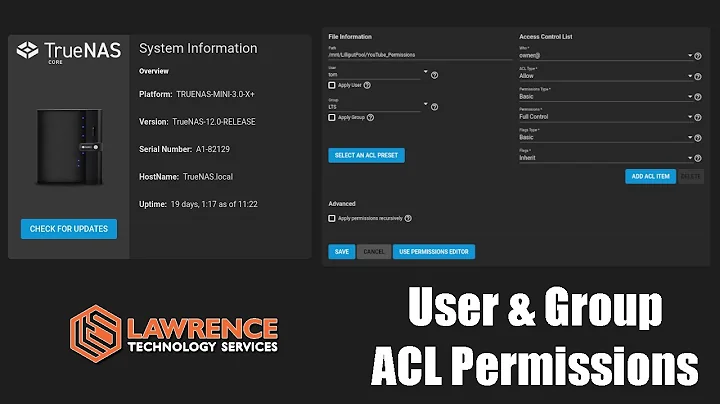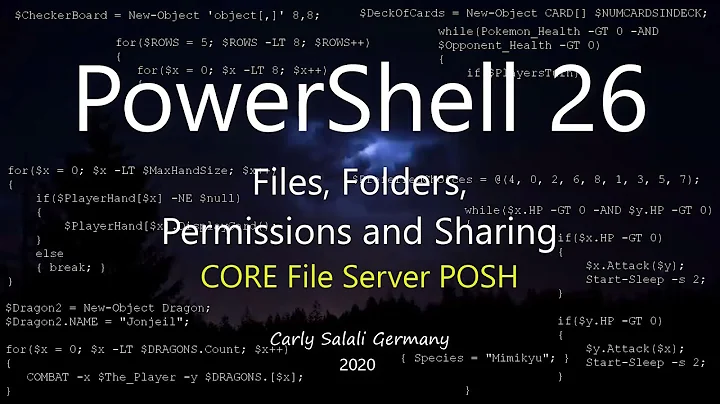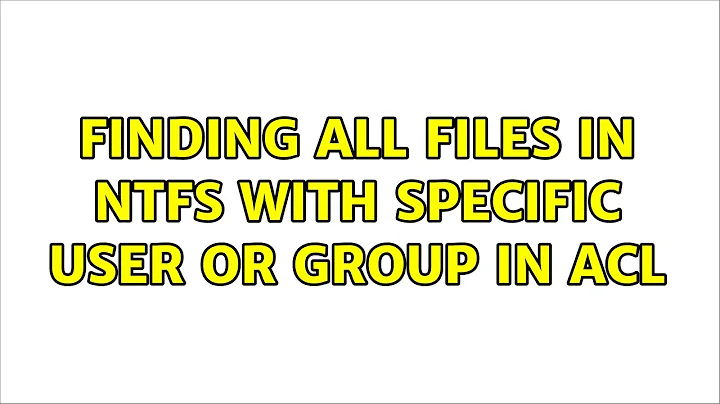Finding all files in NTFS with specific user or group in ACL
Solution 1
Thanks, "unknown". Your PowerShell script doesn't work for me, but I hacked together something that does. I'm new to it, too, but after some trial and error:
Get-ChildItem "C:\SOME\DIR" -recurse |
ForEach-Object {
$fname = $_.FullName
$acl = Get-Acl $fname
foreach ($e in $acl.Access) {
If ( -not $e.IsInherited -and
$e.AccessControlType -eq "Allow" -and
$e.IdentityReference -eq "SOMEDOMAIN\Somegroup")
{
Write-Host $fname
break
}
}
}
Somebody with PowerShell kungfu could probably clean this up a bit. Note that I have it ignore inherited entries, because I'm only interested in knowing where the access begins.
Solution 2
Untested, and a little new to powershell, but something like this would write it to screen. From there you could dump it to a file or whatever.
Get-ChildItem "RootFolderPath" -recurse |
ForEach-Object {
$acl = Get-Acl $_.FullName
If $acl.ContainsKey "User/Group" {Write-Host $_.FullName}
}
Solution 3
one-liner, but without inheritance filter, 'cause it checks AccessToString Property.
Get-ChildItem "C:\SOME\DIR" -recurse|foreach{if((Get-Acl $_.FullName).AccessToString -like "*DOMAIN\username*"){write-host $_.FullName}}
Related videos on Youtube
David
I'm a software engineer and system administrator at the University of Maryland.
Updated on September 17, 2022Comments
-
David over 1 year
Executive summary: I want to find all the directories and files a particular user or group has access to.
In more detail: I'm looking for a command-line tool to recursively search an NTFS directory for all files and directories where an ACE in the DACL contains a given user or group. If I wanted to modify permissions, I would use subinacl or SetACL. I thought I would be able to use one of these tools to search and display, too, but I'm having trouble finding a straight-forward solution.
I could use SetACL like so:
setacl -on C:\SOME_DIR -ot file -actn list -lst "f:tab;w:d;i:y;" -rec contand then grep for the user of interest, but I'd like a more elegant solution. I'm probably missing something here. Any ideas?
-
 Admin over 14 yearsYou're probably not going to find an elegant solution since it's such an inelegant problem. I would've recommended SetACL, so you're already where I'd recommend you being. (I once had somebody ask me to write a tool to audit and "report" on file permissions on a 6TB 10,000,000+ file shared folder hierarchy. I pointed them at SetACL and said "Good luck-- I wouldn't touch that w/ a 10 foot pole.")
Admin over 14 yearsYou're probably not going to find an elegant solution since it's such an inelegant problem. I would've recommended SetACL, so you're already where I'd recommend you being. (I once had somebody ask me to write a tool to audit and "report" on file permissions on a 6TB 10,000,000+ file shared folder hierarchy. I pointed them at SetACL and said "Good luck-- I wouldn't touch that w/ a 10 foot pole.")
-
-
Zoredache over 14 yearsWill this work if you don't have access to some of the files as administrator?
-
 Madhuri over 14 yearsNope. PS is going to use whatever credientials you run it with, and if that account doesnt have the correct permissions on the file/folder then it won't be able to read the permissions/acl from the file/folder.
Madhuri over 14 yearsNope. PS is going to use whatever credientials you run it with, and if that account doesnt have the correct permissions on the file/folder then it won't be able to read the permissions/acl from the file/folder. -
squillman over 14 yearsNothing will work in that scenario. The account which runs it will need at least Read Permissions rights and Traverse Folder access on the folders you're recursing through.
-
Spence over 14 years@squillman: You might be able to do it with "Backup Operators" rights, the BackupFile APIs, and a strong enough will to parse opaqua binary data streams. >smile< That aside, I agree with you.
-
David over 13 yearsFinally getting back to this. So that's not a bad solution, but the problem I run into is that it fails for filenames containing wildcard characters, e.g.: Get-Acl : The specified wildcard pattern is not valid: foo[bar.txt I've tried escaping $fname before I use it in the call to Get-Acl, but so far (using "-replace '[[]]', '``$0'", for example) without success.
-
 ckujau over 4 yearsIf this answer is correct, it'd be nice to explain what it does :-)
ckujau over 4 yearsIf this answer is correct, it'd be nice to explain what it does :-) -
ienaxxx over 4 yearsSure. First of all i left "-notlike" instead of like, because I'm using it in the opposite way of what is requested here and i forgot to modify in in "-like" before answering. Now the explanation : loop on all subfolders and files, if the current item-ACL's Accesstostring property is LIKE the username, then print out its name.
-
ienaxxx over 4 yearsAccessToString property is a text representation of the ACL.




